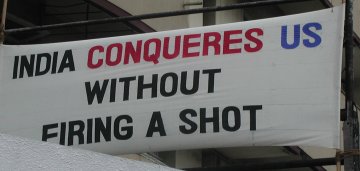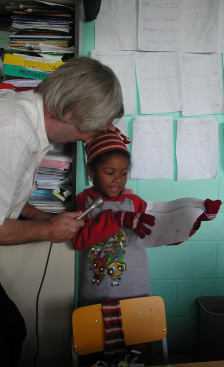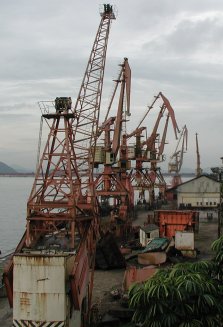

House of Sound
BRICS Programme Three






House of Sound
BRICS: The Rise of Brazil, Russia, India and China
Programme Three: The BRICS Tomorrow
In a daycare centre in a Sao Paolo slum, a group of four year olds sing an exuberant 'Happy Birthday' at a party for some of their class-mates. Presenter Peter Day (below, left) says they could be facing a much brighter future than their parents and grandparents -- if the economists are right, this time, about Brazil's oft-predicted, never-quite-realized, glittering future.
Across town, a group of self-conscious business and law graduates sing a tentative "Happy Birthday" in Cantonese. Their teacher, Alexandre Qi (below, left), tells Peter Day that his Institute offers classes in Chinese language, customs and culture. There's clearly a strong demand for his offerings, from young Brazilians preparing for a future in which their country's fortunes are ever-more-tightly intertwined with China's
Should people in the western countries, in Europe and America, Peter Day wonders, be worried about all these new economies gaining strength?
"I think so!" says Alexandre Qi.
Eugen von Keller runs the Beijing office of the German management consultancy Roland Berger. He keeps a keen eye on the travels of Chinese leaders courting the countries rich in the raw materials needed to fuel China's explosive growth. He has watched, too, the travels of Chinese businessmen, now starting to snap up businesses across Asia and farther afield. And he has watched China achieve dominance, first in the global textiles industry... then in consumer electronics ... and now automotive parts and, increasingly, Research and Development. Before too long, Keller says, it is Chinese consumers, not European consumers, who will decide which features will be built into mobile phones
"But who's going to make what in the west, then!?" Day asks.
"Indeed!" says Eugen von Keller
A similar momentum is building in India. Although armies of young graduates in developing countries still travel to the developed world to seek their fortune, that human tide may be turning. India's exploding high tech inductry is luring many Indian expatriates back home -- decades after they first left their homeland. And "Kris" Gopalakrishnan, co-founder and Chief Operating Officer of the Bangalore-based information and technology giant, Infosys, says his company is deluged with applications for internships from students at Harvard, MIT, INSEAD and the London School of Business.
Sir Martin Sorrell, chief executive of the global marketing colossus WPP, says history suggests that a counterweight to western economic dominance was bound to emerge, sooner or later; it appears to be sooner, and it's time political and business leaders in the US and Europe recognized this.
The Brazilian port of Santos is a forest of cranes. Carlo Lovatelli president of the Brazilian Agro-Business Association, knows that China and the world are hungry for Brazilian iron ore, soy beans, sugar, chickens and concentrated orange juice. Will that give Brazil more political power in the world? Peter Day asks
"I hope so!" Lovatelli says.
Luiz Fernando Furlan (left, above), Brazil's Minister for Development, Industry and Foreign Trade, says any tensions created by Brazil's more assertive stance on the world stage are "perfectly normal. It's like a marriage: when you date, you don't have any frictions, but when you get married, some frictions appear. And managing the frictions ... that's the challenge."
Clyde Prestowitz, a former Reagan administration trade official and author of Three Billion New Capitalists, worries that Americans don't understand the implications of the rise of the BRICs. Within 20 years, he believes, the dollar will no longer be the world's reserve currency; most Americans, he says, appear unaware of what that will mean.
"They don't understand the privilege that the US has," Prestowitz says. "When Americans buy oil, they just print green paper with presidential pictures on it. They don't understand that when Brazilians or Japanese buy oil they've got to sell Lexuses or coffee or something and earn the dollars and then go buy the oil. So when you explain this to an American audience, it comes as a bit of a shock. And then when you suggest that well, there could come a time when oil could be priced in euros and we'd have to sell the Europeans something to get euros to buy the oil, you know, this is a big adjustment! And so it's very important how that adjustment is handled, that it's handled maturely and properly."
Jim O'Neill, the Goldman Sachs economist who first formulated the BRICS thesis, worries that European leaders are in denial about the scale of the competitive threat posed by India and China. Instead of protecting rusting and uncompetitive industries, he says, they should start thinking about opening their borders and opening their minds to the possibility of new industries and niches. If not, he warns, Europe "won't have anything else going for it other than being some great historic place to visit for a vacation."